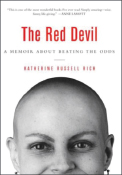BOOKMARK
Title: The Red Devil: To Hell With Cancer—and Back
Author: Katherine Russell Rich
Publisher: Crown
Date Published: October 1999
Price: $23.95, hardcover, 256 pages

Over the past year or so, there have been several best-selling memoirs of people fighting and ultimately losing their battle with cancer. Recent cancer memoirs, such as When Breath Becomes Air by Paul Kalanithi, share sad but positive stories of facing mortality, as the authors contemplate the virtues of living in the moment and cherishing the small things in life that might have been overlooked before their cancer diagnosis. Stories that find hope and beauty in the face of insurmountable odds are inspirational to many who are not living in the world of cancer.
There is, of course, another side to being diagnosed with cancer, one filled with fear and anger and an inability to see life’s small daily treasures. Such a memoir, originally published in October 1999, is The Red Devil: To Hell With Cancer—and Back, written by magazine editor turned freelance writer, Katherine Russell Rich. Although Ms. Rich’s dark humor is riveting, there is not a funny page in this compelling, well-written memoir, one reason why revisiting this older publication is worthwhile for readers of The ASCO Post.
Life in Turmoil
“I found the lump 20 minutes before breakfast, 3 weeks before my marriage broke up. I was taking a shower, soaping myself down, when my fingers slid into it and stopped. They pushed on a little, flew off, returned to confirm, yes, there was something hard and alien in my breast,” writes Ms. Rich in the opening of her memoir. We’ve read so many passages of women finding a lump in their breast, but it never gets easy; the reader will always pause and contemplate the power a pea-sized structure has over the woman who first feels it.
Anger and Social Chaos
At the time, Ms. Rich was a 32-year-old successful magazine editor whose marriage had fallen apart. After discovering the lump in her breast, she called a close friend and whispered into the phone, “On top of everything, I found a lump in my breast. I can’t do it: I can’t go on!” Despite assurances from her friend, the lump, of course, is cancer. But before she is diagnosed, she waits several months, being assured by her internist that, given her age, it was probably a cyst. After months of mental anguish, she finally has a needle biopsy, which confirmed her worst fear: She had breast cancer. Ms. Rich reacts with an emotional cocktail of fear and anger that explodes off the pages.
There are times when the book is less a story about fighting cancer and more of battling the loneliness attached to living in the ‘cancer world'.—
Tweet this quote
She is convinced that her lifestyle—smoking, drinking, eating meat, and her tendency to internalize stress—has caused the cancer. To that end, she cites several studies that, in her mind, confirm her self-evaluation. Her constant feeling that she cannot appreciate life because it had yet to get to the good part when it all fell apart fuels her cancer anger.
While not getting overly clinical, Ms. Rich does a wonderful job describing her therapies. Her first chemotherapy session left her with a “permanent taste of sauerkraut in my mouth.” The second, doxorubicin—the Red Devil—zaps her head with a “violent buzz.” Some of the details are quite graphic, as she talks about her hair falling out in chunks, her own hideous body odor caused by the toxic chemicals she’s taking, the near-death blood clot from tamoxifen, and the tumors breaking through bones into the spinal column. There’s more, but instead of bogging down the narrative, as intense medical description often does, Ms. Rich’s journalistic writing style captures each detail of her procedures and their side effects in a way that brings the reader into her experience, grippingly so.
Lack of Support
Along with the medical drama, there are family and professional episodes that truly frill down into the cancer experience, rarely written about with such frankness. The author’s parents are emotionally reserved individuals who do not seem to have the emotional wherewithal to support their daughter in her desperate situation. Her father, a Christian Scientist, has difficulty even uttering the word cancer.
There are times when the book is less a story about fighting cancer and more of battling the loneliness attached to living in the “cancer world.” One of the most heart-wrenching sections is when she loses her job as a writer because her cancer, which has spread, caused her to miss assignments. There’s a psychologist who has difficulty with Ms. Rich because cancer isn’t in Freud; an oncologist who drops her because she’s “just too difficult”; and a new boyfriend who, in an act of cowardice that will make the reader furious, escapes from the ER, promising to return, but doesn’t. In the end, at 38, her cancer is so advanced that Ms. Rich says she is “the only woman in the United States eager to reach 40.”
Her Long Hard Battle Ends
Although this gritty, in your face, beautifully written cancer memoir never wanders into poetic self-reflection and living life at its fullest sentiment, it is never nihilistic in the exploration of life, as the author looks into her personal mirror of mortality without blinking. Thus, it is a valuable book for patients with cancer and their doctors. Against all odds, Ms. Rich battled breast cancer for nearly 25 years; she died at the age 56 on April 6, 2012.
She’d left her world as an editor for the much chancier profession of freelance writer, explaining why in an interview: “The life of a writer was uncertain, but as a writer, it seemed, I might leave a mark.” She did. This book is recommended for readers of The ASCO Post. ■

